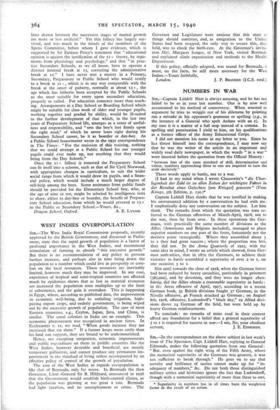WEST INDIES OVERPOPULATION
Sut,—The West India Royal Commission proposals, recently approved by the British Government, and discussed in Parlia- ment, state that the rapid growth of population is a factor of profound importance in the West Indies, and recommend stimulation of farming to absorb " this excessive growth." But there is no recommendation of any policy to prevent further increase, and perhaps also in time bring down the population to a number which could live in prosperity or com- fort on the local resources. These resources are inevitably limited, however much they may be improved. In any case, experience of tropical and semi-tropical countries not affected much by epidemics shows that as fast as material resources are increased the population soon multiplies up to the limit of subsistence, and the gain is overtaken. This is happening in Egypt, where, according to published data, the improvement in economic well-being, due to unfailing irrigation, high- paying export crops, and orderly government, is being wiped out by the excessive growth of population. The case of most Eastern countries, e.g., Ceylon, Japan, Java, and China, is similar. The canal colonies in India are an example. This economic phenomenon was recognised in ancient times. In Ecclesiastes v. 11, we read, " When goods increase they are increased that eat them." If a farmer keeps more cattle than his land can support, they are bound to be undernourished.
Hence, not excepting emigration, economic improvements and public expznditure on them in prolific countries like the West Indies, however desirable and beneficial, are merely temporary palliatives, and cannot produce any permanent im- provement in the standard of living unless accompanied by an effective policy of control of the growth of population.
The case of the West Indies as regards overpopulation is like that of Bermuda, only far worse. In Bermuda the then Governor, Lieut.-General Sir R. Hildyard, announced in 1936 that the Government would establish birth-control clinics, as the population was growing at too great a rate. Bermuda had light taxation, and no unemployment or crime. The Governor and Legislature were anxious that this state of things should continue, and, as emigration to the United States had been stopped, the only way to secure this, they held, was to check the birth-rate. At the Governor's invita- tion Mrs. Margaret Sanger, of New York, visited Bermuth, and explained clinic organisation and methods to the Health Department.
If this policy, officially adopted, was sound for Bermuda, it must, on the facts, be still more necessary for the West Indies.—Yours faithfully,






















































 Previous page
Previous page